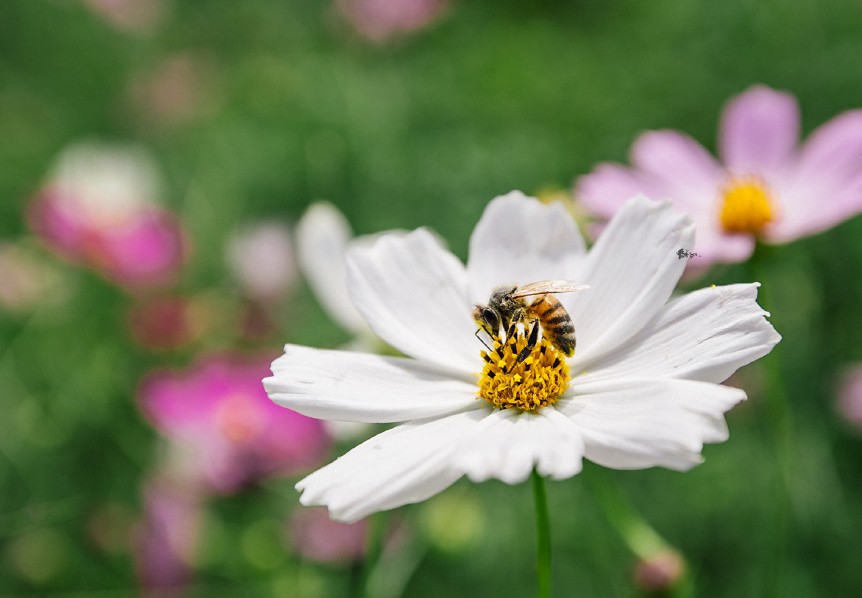
昨天BBC出現了一則新聞,台灣新聞用著不同的標題來報導,
【濫用農藥的後果!全球75%蜂蜜含神經毒素】
【全球75%蜂蜜含對蜜蜂有害殺蟲劑影響其授粉及存亡】
【研究:全球75%蜂蜜含殺蟲劑】
其中甚至有幾篇報導寫著:
「生物學家Dave Goulson表示,目前還無法了解多少蜂蜜可以對人體造成永久傷害;但可以確定的是,長久食用這些蜂蜜,一定會對人類的中樞神經造成負面影響,「如果你天天都吃,就等於是慢性的服用神經毒素」。」
這兩天許多客人擔心的拿著這則新聞來詢問,
於是小編上網找了一下BBC原始新聞的報導,
發現原文【沒有食用這些蜂蜜會對人體造成傷害的說法。】
Pesticides linked to bee deaths found in most honey samples – BBC.com
以上為原文網址,大家有興趣可以進去點來看,
小編這邊擷取部分內文資訊貼上來給大家看。
A new study has found traces of neonicotinoid chemicals in 75% of honey samples from across the world.The scientists say that the levels of the widely used pesticide are far below the maximum permitted levels in food for humans.
In one-third of the honey, the amount of the chemical found was enough to be detrimental to bees.Industry sources, though, dismissed the research, saying the study was too small to draw concrete conclusions.Neonicotinoids are considered to be the world’s most widely used class of insecticides.
一項新研究發現,來自世界各地的75%的蜂蜜樣品中有新菸鹼類化學物質。
科學家們說,廣泛使用的農藥水平遠遠低於人類食物允許的最高水平。
在三分之一的蜂蜜中,發現的化學物質量足以對蜜蜂有害。
不過業內人士駁斥了這項研究,認為這項研究太小,無法得出具體的結論。
新菸鹼被認為是世界上使用最廣泛的一類殺蟲劑。
The authors believe though that the finding should not be a worry to people who eat honey.
“It is well below the limit so I think it is not a major public health concern,” author Dr Alexandre Aebi from the University of Neuchatel in Switzerland, told BBC News.
“We would have to eat an awful lot of honey and other contaminated products to see an effect, but I think it’s a warning and it is a call for a precautionary principle. Neonics have just been shown to be endocrine perturbators for honey bees, so who knows?”
The bigger concern according to Dr Aebi was the impact on bees and other pollinators. Some 34% of the honey samples showed the presence of neonics at levels that would harm bees.
作者認為,這個發現不應該是吃蜂蜜的人的擔心。
來自瑞士納沙泰爾大學的Alexandre Aebi博士對BBC新聞說:“這遠遠低於極限,
所以我認為這不是一個重大的公共衛生問題。
“我們必須吃很多蜂蜜和其他受污染的產品才能看到效果,但我認為這是一個警告,
這是一個預防原則的呼籲。新菸鹼剛被證明是蜜蜂的內分泌干擾物,所以誰知道?”
根據Aebi博士的更多關注是對蜜蜂和其他傳粉者的影響。
約34%的蜂蜜樣品顯示存在危害蜜蜂的水平的新菸鹼。
“Neonicotinoids are highly persistent in the environment, and frequently turn up in soils, water samples, and in wildflowers, so we would expect to find them in honey,” said Dave Goulson, professor of biology at the University of Sussex, who was not involved in the study.
“Entire landscapes all over the world are now permeated with highly potent neurotoxins, undoubtedly contributing to the global collapse of biodiversity. Some of us have been pointing this out for years, but few governments have listened.”
蘇塞克斯大學生物學教授戴夫·古爾森(Dave Goulson)說:
“新菸鹼在環境中是高度持久的,經常在土壤,水樣和野花中出現,
所以我們期望用蜂蜜發現它們。”參與研究。
“世界各地的整個景觀現在都滲透著高度有力的神經毒素,
無疑有助於全球生物多樣性的崩潰,我們一些人一直指出這一點,但很少有政府傾聽。
蜂蜜有神經毒?
小編的英文不太好,翻譯的部分只能求助google,
但大家應該看的出來,這篇文章的重點其實是在講新品種農藥對小蜜蜂的影響,
“It is well below the limit so I think it is not a major public health concern,”
這遠遠低於極限,所以我認為這不是一個重大的公共衛生問題。
“We would have to eat an awful lot of honey and other contaminated products to see an effect,
“我們必須吃很多蜂蜜和其他受污染的產品才能看到效果
由這兩句就可以知道,蜂蜜內驗出來殘留的新菸鹼,只會對小蜜蜂有影響,對人類是不會有影響。
生物學家Dave Goulson說的慢性毒素?
請回頭看上面翻譯的最後一段,生物學家Dave Goulson講到的神經毒素指的是對地球環境的破壞,根本沒有報導裡面的「如果你天天都吃,就等於是慢性的服用神經毒素」,這段話是被杜撰出來危言聳聽的一句話。在此特別查證,希望大家不要過度擔心。
農藥的新聞,其實全世界各地包括歐盟,台灣的政府,早就注意到這個問題,在數年前即著手管制類尼古丁的農藥,台灣常見的有益達胺,可尼丁等,在310項農殘檢驗裡,都已經有包含。
蜜蜂故事館蜂蜜皆逐批檢驗,購買後可從瓶身標示的安心驗證碼來查詢產地與檢驗報告,
我們努力的這一切,只為了讓小蜜蜂辛苦採集的花蜜,可以美好完整的呈現給大家安心享用。
安心驗證網址
https://www.honeymuseum.com/verif.php
蜜蜂故事館好蜂蜜
https://www.honeymuseum.com/shop.php
